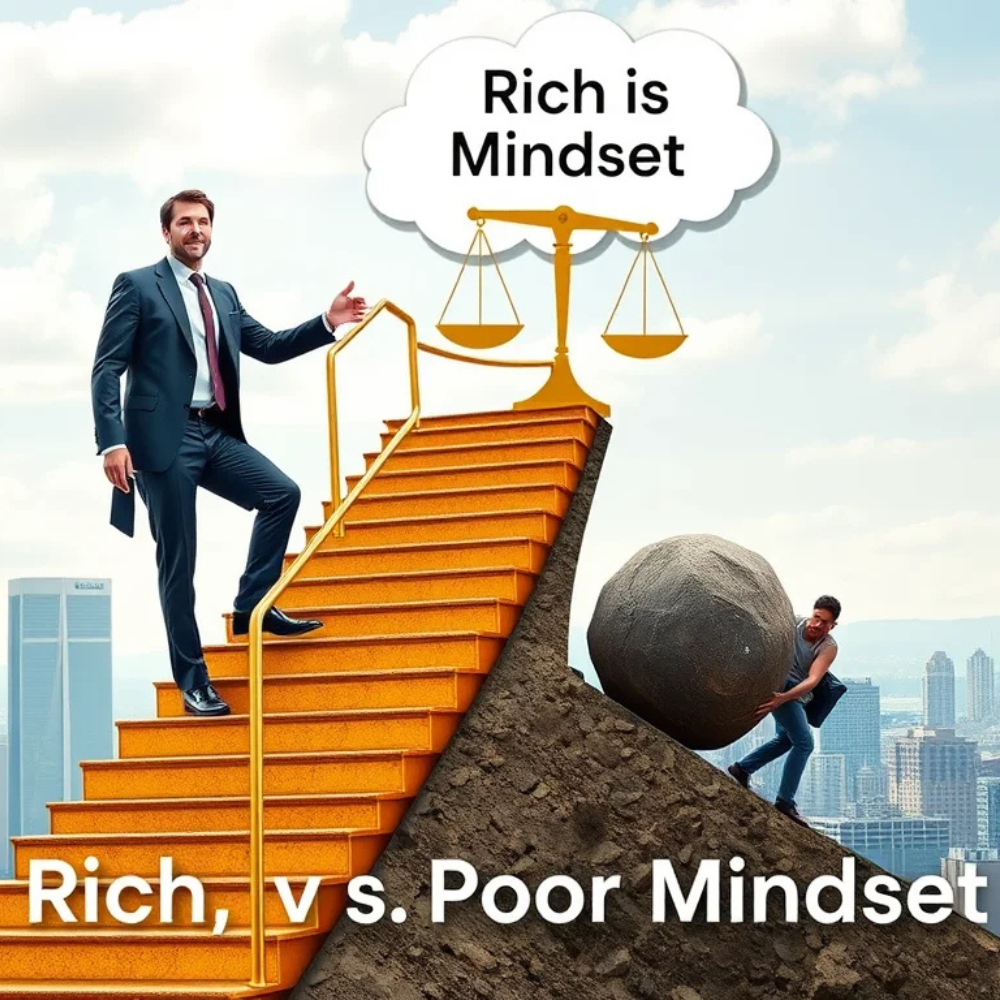Have you ever wondered why some people seem to effortlessly accumulate wealth while others struggle to make ends meet? 🤔 The answer might lie not in their bank accounts, but in their minds. Welcome to the intriguing world of the Rich vs. Poor Mindset.
Imagine two individuals starting from the same point, with similar opportunities. Fast forward a few years, and one is thriving financially while the other is barely scraping by. What’s the difference? It’s not just about luck or circumstances—it’s about how they think. The rich mindset sees opportunities where others see obstacles, focuses on growth rather than limitations, and views money as a tool rather than a goal.
In this eye-opening exploration, we’ll dive deep into the characteristics that define the rich and the poor, not just in terms of wealth, but in their approach to life and finances. We’ll uncover the building blocks of a mindset and how it shapes our financial destiny. By the end of this journey, you’ll have a clearer understanding of where you stand and, more importantly, how you can shift your thinking to align with success. So, are you ready to unlock the secrets of the wealthy? Let’s begin by examining who exactly we mean when we talk about “the rich” and “the poor.”
Who are the rich?

Defining the Rich: Beyond Monetary Wealth
Characteristics of the Wealthy
The rich are not merely defined by their bank account balance, but by a combination of financial, mental, and lifestyle attributes:
- Financial Independence
- Multiple Income Streams
- Investment-Focused
- Continuous Learning
- Risk-Taking Ability
Wealth Creation Habits
Rich individuals often share common habits that contribute to their success:
| Habit | Description |
|---|---|
| Goal Setting | Setting clear, actionable financial goals |
| Budgeting | Careful tracking and allocation of resources |
| Networking | Building valuable connections and relationships |
| Delayed Gratification | Prioritizing long-term gains over short-term pleasures |
| Continuous Education | Investing in personal and professional development |
The Millionaire Mindset
A key aspect of being rich is adopting a millionaire mindset, characterized by:
- Abundance thinking
- Embracing calculated risks
- Seeing opportunities in challenges
- Valuing time as a precious resource
- Focusing on creating value for others
Rich individuals often view money as a tool for growth and impact rather than an end goal. They prioritize financial literacy, seek mentorship, and are proactive in wealth-building strategies. This mindset shift from scarcity to abundance is crucial in transforming one’s financial trajectory.
Now that we’ve explored who the rich are, let’s examine the contrasting perspective of those considered poor.
Who are the poor?

Financial Challenges
Poor individuals often face significant financial challenges that can make it difficult to break the cycle of poverty. These challenges include:
- Limited access to financial resources
- Higher interest rates on loans
- Lack of savings for emergencies
- Difficulty obtaining credit
Mindset and Behavior Patterns
The poor often exhibit certain mindset and behavior patterns that contribute to their financial situation:
- Short-term thinking
- Risk aversion
- Limited financial education
- Belief in scarcity
Socioeconomic Factors
Several socioeconomic factors contribute to poverty:
| Factor | Impact |
|---|---|
| Education | Limited access to quality education |
| Employment | Low-wage jobs or unemployment |
| Healthcare | Inadequate access to healthcare |
| Housing | Substandard or unstable housing conditions |
Breaking the Cycle
While challenging, it is possible to break the cycle of poverty through:
- Developing a growth mindset
- Seeking financial education
- Building valuable skills
- Creating multiple income streams
By understanding these aspects of poverty, we can better appreciate the challenges faced by those with limited financial resources. This knowledge is crucial as we explore the concept of mindset and its role in financial success.
What makes up a Mindset?

Compounded interest works for the rich and against the poor
The concept of compound interest is a powerful force that can significantly impact one’s financial future. For the rich, it’s a tool for wealth multiplication, while for the poor, it often becomes a burden.
| Rich Mindset | Poor Mindset |
|---|---|
| Invest early and consistently | Delay saving and investing |
| Understand the power of time | Focus on immediate needs |
| Leverage compound interest | Fall victim to compound debt |
Rich individuals tend to start investing early, allowing their money to grow exponentially over time. They understand that even small, regular investments can lead to substantial wealth accumulation.
Rich people expenditure vs Poor people expenditure
The spending habits of the rich and poor differ significantly, reflecting their contrasting mindsets towards money management.
Rich people:
- Invest in assets that generate income
- Focus on long-term value
- Prioritize experiences and personal growth
Poor people:
- Spend on liabilities and depreciating assets
- Prioritize immediate gratification
- Focus on short-term needs and wants
Goals: rich people think long-term, poor people live on instant gratification
Long-term thinking is a hallmark of the wealthy mindset. Rich individuals set ambitious, far-reaching goals and work consistently towards achieving them. They understand the value of delayed gratification and are willing to sacrifice short-term pleasures for long-term success.
In contrast, those with a poverty mindset often struggle to plan beyond their immediate needs. They tend to focus on quick fixes and instant rewards, which can hinder their ability to build lasting wealth.
Attitude towards risk
The rich and poor often have vastly different approaches to risk. Wealthy individuals view calculated risks as opportunities for growth and wealth creation. They understand that some level of risk is necessary for significant returns and are willing to step out of their comfort zones.
On the other hand, those with a poverty mindset often avoid risks altogether, fearing potential losses. This risk-averse behavior can limit their opportunities for financial growth and advancement.
Attitude towards Learning
A key differentiator between the rich and poor mindsets is the approach to continuous learning and self-improvement. The wealthy tend to view education as a lifelong journey, constantly seeking new knowledge and skills to enhance their financial acumen and overall success.
Those with a poverty mindset may view education as a finite process, ending with formal schooling. This limited perspective can hinder personal growth and adaptability in an ever-changing economic landscape.
Now that we’ve explored the key components of rich and poor mindsets, let’s consider how these attitudes can be shifted and transformed for greater financial success.
Join our newsletter

Start the adventure now
Ready to embark on your journey towards financial success? Join our newsletter and gain access to exclusive insights that will transform your mindset from scarcity to abundance. Here’s what you can expect:
- Weekly tips on wealth creation habits
- Expert advice on developing a success mindset
- Strategies for financial mindset shifts
- Real-life success stories to inspire you
Our newsletter is designed to help you break free from a poverty mentality and embrace abundance thinking. By subscribing, you’ll be taking the first step towards cultivating a millionaire mindset.
| Newsletter Benefits | What You’ll Get |
|---|---|
| Exclusive Content | In-depth articles on wealth building strategies |
| Expert Insights | Interviews with successful entrepreneurs and financial experts |
| Action Plans | Step-by-step guides for implementing financial success tips |
| Community Support | Access to a network of like-minded individuals on the same journey |
Don’t let another day pass without taking action towards your financial goals. Subscribe now and start your transformation today. Remember, the journey of a thousand miles begins with a single step – and this is yours.

The stark contrast between rich and poor mindsets goes far beyond financial status. It’s about how individuals perceive opportunities, handle challenges, and approach life. The rich often embody a growth-oriented, possibility-focused mentality, while the poor may struggle with limiting beliefs and scarcity thinking. Understanding these differences is crucial for anyone seeking to improve their financial situation and overall quality of life.
By cultivating a rich mindset, you can unlock your potential and create new possibilities for success. Remember, your mindset is not fixed—it can be transformed with conscious effort and the right guidance. Take the first step towards a more prosperous future by joining our newsletter, where we’ll provide you with valuable insights, tips, and strategies to develop a wealth-oriented mindset and achieve your financial goals.




